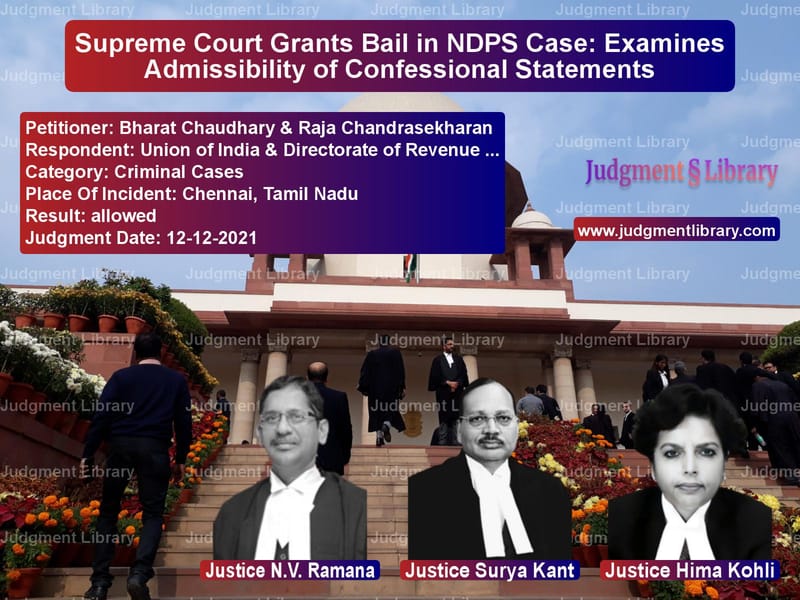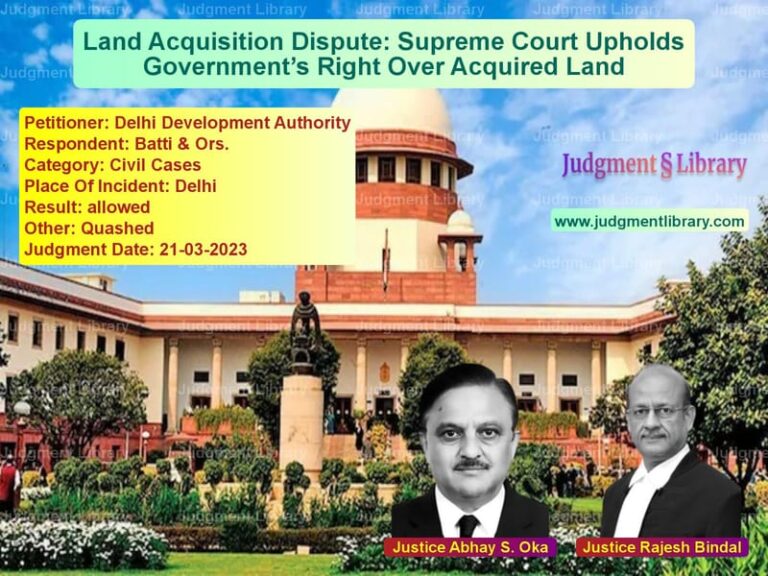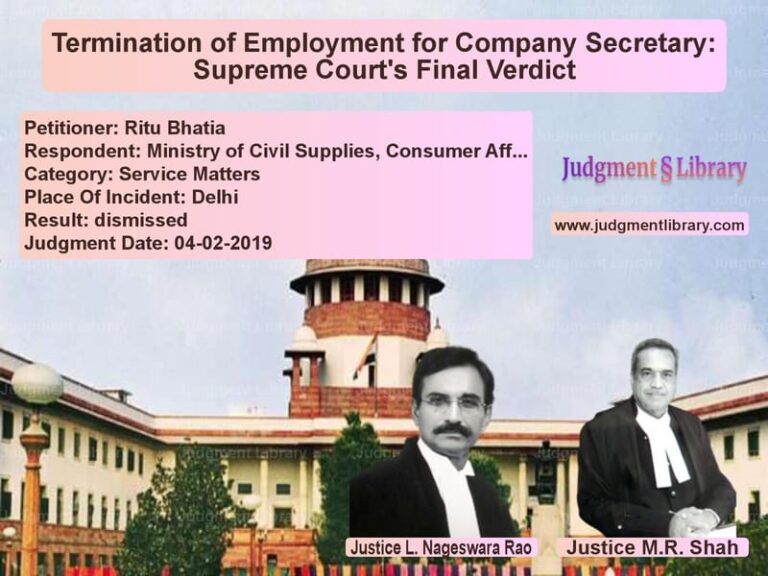Supreme Court Grants Bail in NDPS Case: Examines Admissibility of Confessional Statements
The Supreme Court of India recently ruled in Bharat Chaudhary vs. Union of India and Raja Chandrasekharan vs. Directorate of Revenue Intelligence, addressing bail applications in a high-profile Narcotic Drugs and Psychotropic Substances (NDPS) Act case. The Court granted bail to both accused, emphasizing the need for substantial evidence beyond confessional statements made to investigating agencies.
Background of the Case
The Directorate of Revenue Intelligence (DRI) conducted an operation in Chennai, where it seized approximately 1,37,665 tablets containing psychotropic substances, collectively weighing 90 kg. The seizures were made from four locations:
- Office of M/s. Aviation Star Express, a franchisee of DHL Express India Private Limited.
- 2 Destination, a franchisee of S.T. Courier.
- Residence of Raja Chandrasekharan (A-1), the proprietor of Ascure Pure Herbals.
- Office premises of DHL Express India Private Limited.
Based on these seizures, the DRI arrested Raja Chandrasekharan (A-1), M.V. Srinivasan (A-2), and M. Ashok Kumar (A-3), charging them under Sections 8(c), 22(c), 25, 28, and 29 of the NDPS Act. The investigation further led to the arrest of Bharat Chaudhary (A-4), allegedly the main supplier, who was detained in Jaipur on March 17, 2020 and transferred to Chennai.
Legal Issues Raised
- Whether confessional statements made under Section 67 of the NDPS Act were admissible as evidence.
- Whether the delay in obtaining forensic reports affected the prosecution’s case.
- Whether there was sufficient material beyond the co-accused’s statements to establish guilt.
- Whether the seized substances contained commercial quantities of narcotic or psychotropic substances.
Petitioner’s Arguments (Bharat Chaudhary & Raja Chandrasekharan)
- No direct seizure: The petitioners argued that no contraband was seized from Bharat Chaudhary’s residence or office.
- Statements under Section 67 are inadmissible: They cited the Supreme Court’s ruling in Tofan Singh vs. State of Tamil Nadu (2020), which held that confessional statements made to investigating officers are not admissible evidence.
- Delay in forensic analysis: The forensic reports of seized tablets were delayed, leading to uncertainty regarding their composition.
- No live link: There was no direct evidence connecting Bharat Chaudhary with the seized substances or proving his role in the conspiracy.
- Unlawful procedures: The petitioners contended that proper procedures under Sections 42 and 52A of the NDPS Act were not followed in sampling and testing.
Respondent’s Arguments (Union of India & DRI)
- The DRI argued that Bharat Chaudhary was the mastermind, arranging the supply of psychotropic substances disguised as herbal medicines for export to the U.S.
- The agency relied on WhatsApp chats, bank transactions, and statements of A-1 to A-3 to establish a connection.
- The forensic report confirmed that some seized tablets contained prohibited substances, justifying the prosecution.
- The agency contended that the twin conditions for bail under Section 37 of the NDPS Act were not satisfied, as there were reasonable grounds to believe the accused were guilty.
Supreme Court’s Verdict
The Supreme Court, in a bench comprising Chief Justice N.V. Ramana, Justice Surya Kant, and Justice Hima Kohli, ruled in favor of the accused and granted bail.
The Court observed:
“In the absence of psychotropic substances in the conscious possession of A-4, reliance on the statement made by A-1 to A-3 under Section 67 of the NDPS Act is too tenuous a ground to sustain the impugned order.”
Key Observations by the Supreme Court
- The prosecution’s reliance on confessional statements under Section 67 of the NDPS Act was insufficient, as such statements are not admissible evidence.
- Forensic reports lacked clarity regarding the quantitative analysis of psychotropic substances, making it difficult to establish the presence of a commercial quantity.
- None of the seized substances were found at Bharat Chaudhary’s premises.
- Digital evidence, such as WhatsApp messages and bank records, required further forensic examination and was insufficient at this stage to establish guilt.
- The failure to establish a direct link between Bharat Chaudhary and the seized substances weakened the prosecution’s case.
The Court ruled:
“The impugned order canceling the bail granted in favor of Bharat Chaudhary is set aside, and the order dated 2nd November, 2020, passed by the learned Special Judge, EC & NDPS Cases, is restored.”
Final Order
- The Supreme Court granted bail to Bharat Chaudhary (A-4) and restored the Special Judge’s order.
- The Court also granted bail to Raja Chandrasekharan (A-1), considering he had already spent over two years in custody.
- The trial court was directed to impose appropriate bail conditions.
- The ruling clarified that the observations made were limited to the bail stage and would not influence the trial.
Key Takeaways
- Section 67 statements are inadmissible: The ruling reinforces the principle that confessions to investigating officers are not admissible as evidence.
- Bail cannot be denied solely on co-accused’s statements: The Court emphasized that statements of other accused persons are insufficient grounds to deny bail.
- Forensic clarity is necessary: The Court noted that lack of precise forensic reports on the quantity of psychotropic substances weakened the prosecution’s case.
- Due process under NDPS Act must be followed: The ruling highlights the need for strict compliance with procedural safeguards in drug-related cases.
This landmark judgment sets an important precedent for NDPS cases, ensuring that bail decisions are based on legally admissible evidence rather than mere confessions and circumstantial links.
Petitioner Name: Bharat Chaudhary & Raja Chandrasekharan.Respondent Name: Union of India & Directorate of Revenue Intelligence.Judgment By: Justice N.V. Ramana, Justice Surya Kant, Justice Hima Kohli.Place Of Incident: Chennai, Tamil Nadu.Judgment Date: 12-12-2021.
Don’t miss out on the full details! Download the complete judgment in PDF format below and gain valuable insights instantly!
Download Judgment: bharat-chaudhary-&-r-vs-union-of-india-&-dir-supreme-court-of-india-judgment-dated-12-12-2021.pdf
Directly Download Judgment: Directly download this Judgment
See all petitions in Bail and Anticipatory Bail
See all petitions in Drug Possession Cases
See all petitions in Fraud and Forgery
See all petitions in Judgment by N.V. Ramana
See all petitions in Judgment by Surya Kant
See all petitions in Judgment by Hima Kohli
See all petitions in allowed
See all petitions in supreme court of India judgments December 2021
See all petitions in 2021 judgments
See all posts in Criminal Cases Category
See all allowed petitions in Criminal Cases Category
See all Dismissed petitions in Criminal Cases Category
See all partially allowed petitions in Criminal Cases Category







